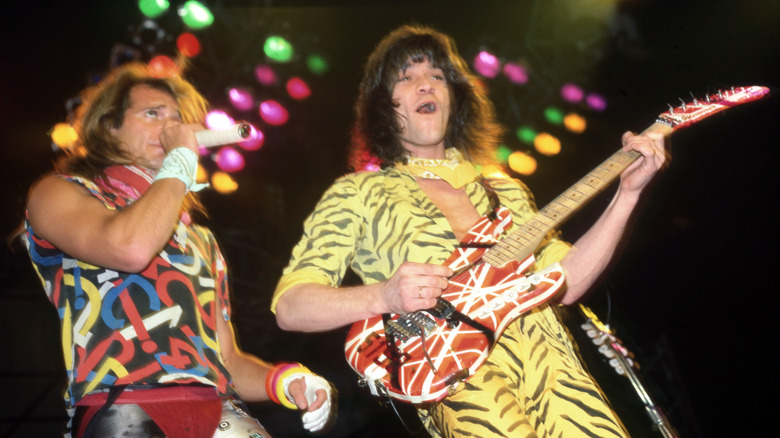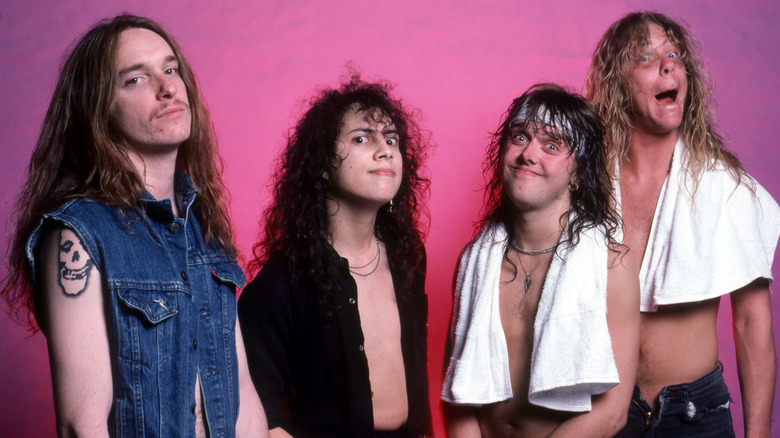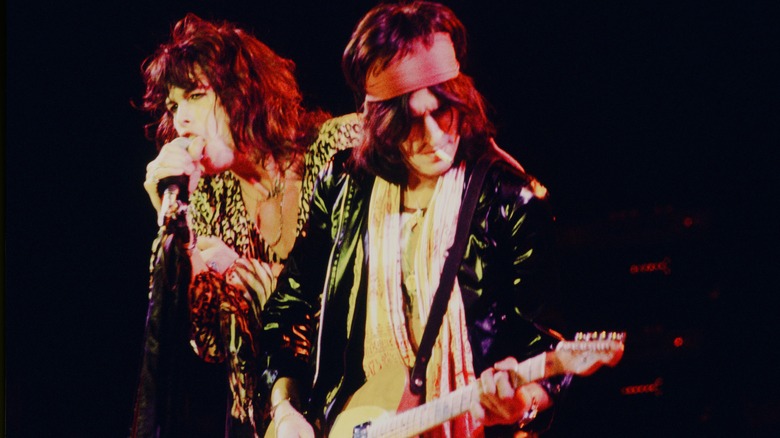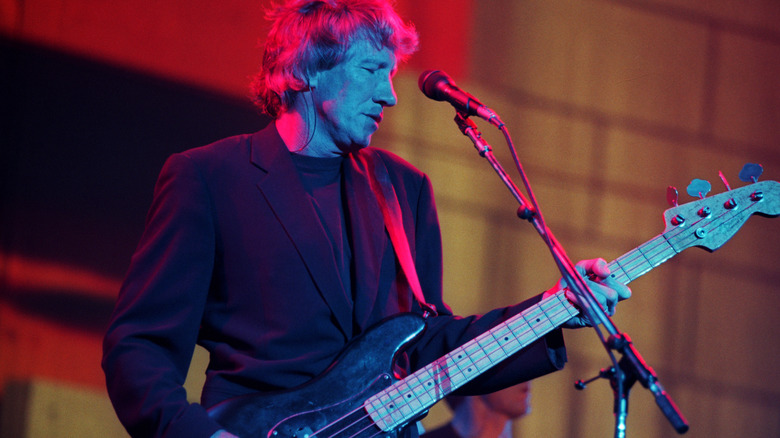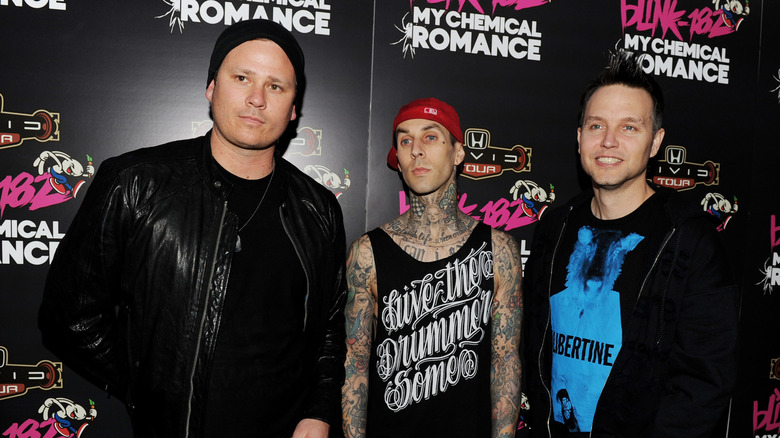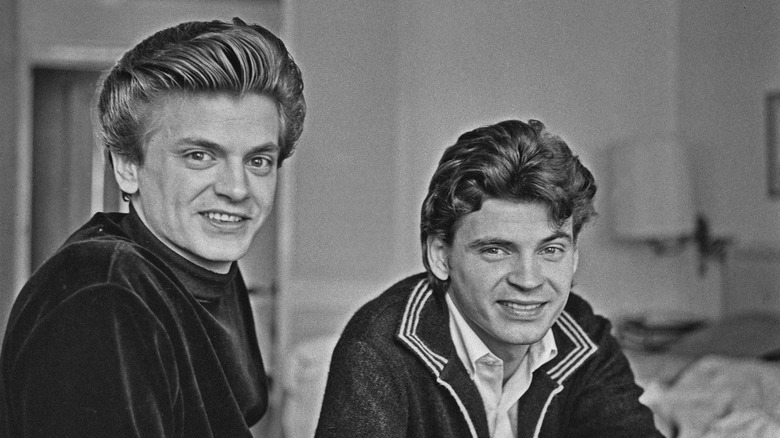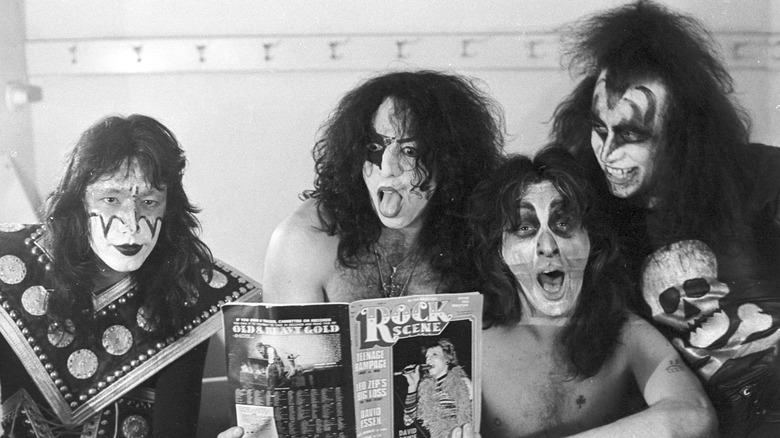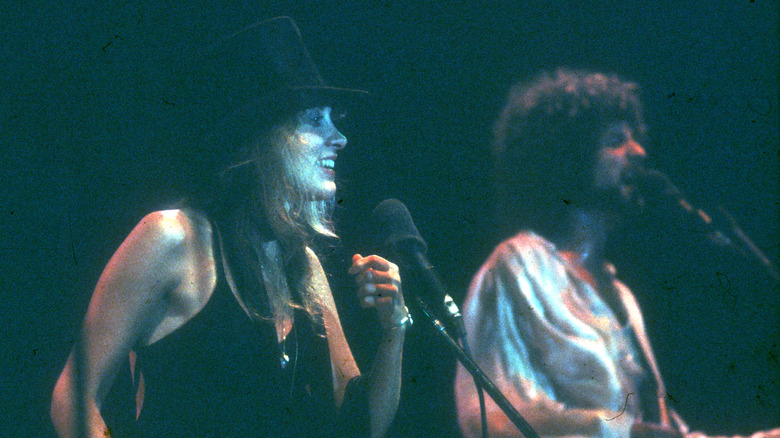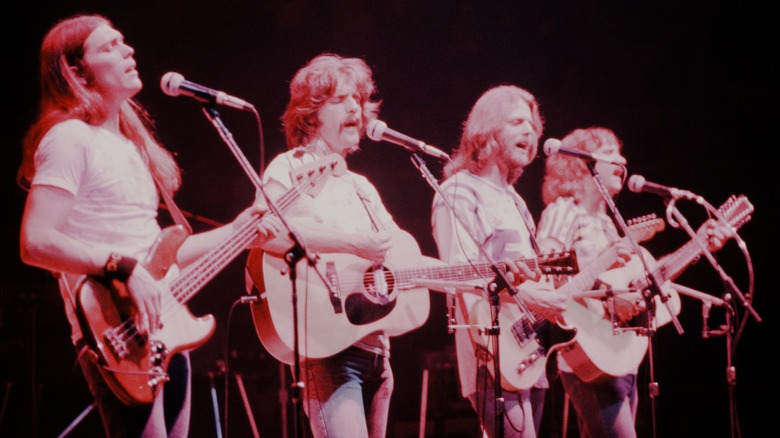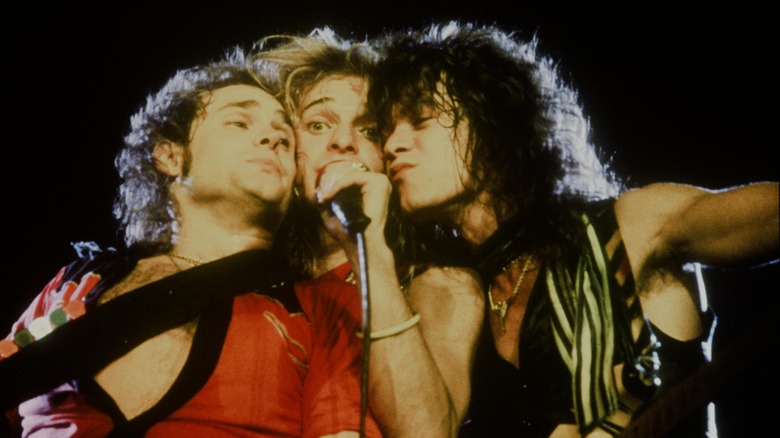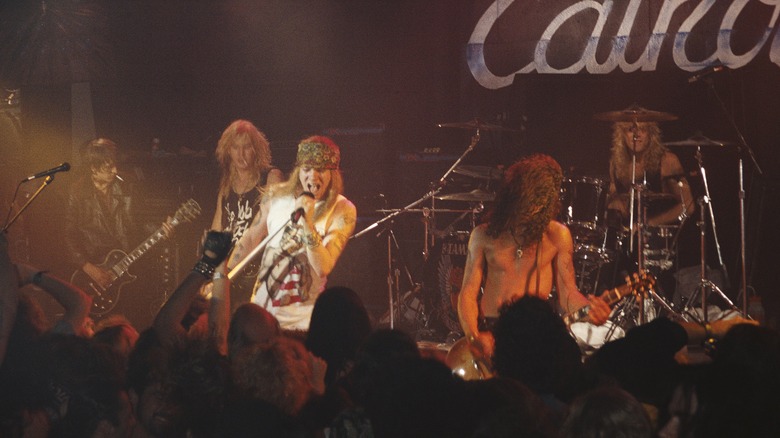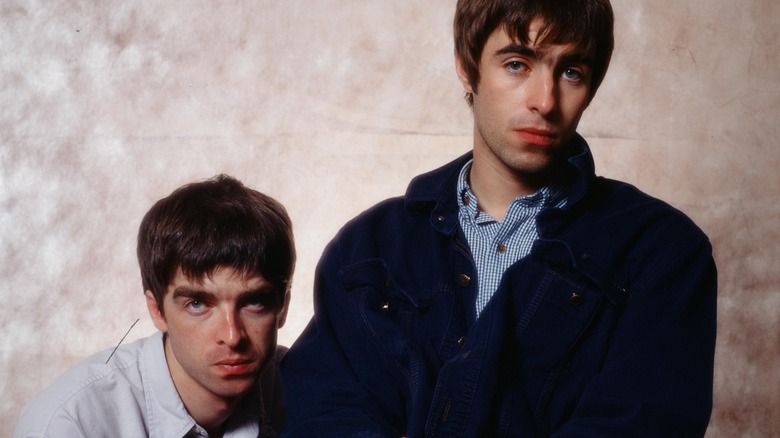Rock Bands With The Worst Drama
Combine a bunch of young, hungry kids who've never had serious jobs with huge egos, uncompromisable artistic visions, nigh-unlimited access to drugs and alcohol, legions of screaming fans, groupies willing to indulge their every carnal desire, and bucketloads of "screw you" money — and cram them all on a smelly tour bus for 10 months a year, and you'll wind up in some serious trouble. Given all that, it's no surprise that nearly every major rock band has had more than its fair share of backstage blowups, fistfights, firings, quittings, lawsuits, and ugly feuds that last for decades, with bruised egos trading shots through the press. After all, the conditions just described hardly equip people to deal with disagreements in a healthy way. Just look at this hilariously petty list of Rock & Roll Hall of Fame no-shows, compiled by Rolling Stone, to get a gist of how ugly things can get in the world of rock.
So many groups have fallen apart or barely held it together that many legendary rock n' roll infighters couldn't even fit on this list. But the ones who did can certainly teach us how not to deal with coworkers and kids. Here are some rock bands with the worst drama in rock history.
Metallica
If you're in a metal band where everyone's getting along, you might be doing it wrong. And nobody knows drama more than Metallica, and, by extension, fellow "big four" '80s thrash metal outfit Megadeth. True fans are familiar with the story. Current Megadeth frontman Dave Mustaine was originally the lead guitar player in Metallica. It didn't last long. All members of Metallica drank heavily, earning the nickname "Alcoholica." But according to Loudwire, Mustaine was what he himself described as "a violent drunk." He said, "I lost all inhibitions when I was drinking, and that didn't go over too well in the end."
On April 11, 1983, fed up with Mustaine, frontman James Hetfield and drummer Lars Ulrich gave Mustaine a bus ticket and told him he was out of the band. Kirk Hammett, who's still with the group, had already been hired to replace him.
Fueled by humiliation and rage and itching for vengeance, Mustaine would ultimately form thrash metal band Megadeth, with the goal of rivalling Metallica. It would never match Metallica's success, but at 50 million records sold (per Warner Music Group), it's hard to argue Mustaine didn't mount an impressive comeback.
Still, tensions remained. Mustaine was infamously bitter about his firing for decades, even complaining about it to Ulrich in a decidedly un-metal therapy session, as seen on Metallica's "Some Kind of Monster" documentary.
Aerosmith
They weren't called the "Toxic Twins" for nothing. Singer Steven Tyler and guitarist Joe Perry of Aerosmith had an appetite for drugs that rivals anyone in music history. Combine that with a grueling, almost non-stop touring schedule for the second half of the '70s and you'll be in a world of trouble.
That's exactly where Aerosmith found itself on July 28, 1979, according to Ultimate Classic Rock. "We were pretty burned out," Joe Perry said in an interview, referring to the band's brutal touring schedule leading up to the fateful moment. "And instead of taking a vacation, we let loose on each other." It started when Joe's wife, Elyssa Perry, got into a backstage fight with bassist Tom Hamilton's wife, Terry Hamilton. Then Tom and Joe got involved, followed by Tyler, and it all unraveled. The huge fight eventually led to Joe, frustrated after months of touring and going-nowhere attempts to record a follow up to "Draw the Line," then two years old, leaving the group.
He would return (via Ultimate Classic Rock) in the early '80s, while Aerosmith also fell on seriously hard times in his absence. The group would go on to achieve massive success in the late '80s and throughout the '90s, but the tension never fully went away. Sobriety and maturity certainly helped the Bad Boys from Boston achieve a better working relationship, but at one relatively recent point, Joe still wanted to have Tyler replaced, as per Ultimate Classic Rock.
Pink Floyd
Great artists tend to clash a lot. That's definitely the case with Pink Floyd's two leading men: singer/guitarist David Gilmour and bassist/singer Roger Waters. As Far Out Magazine details, Gilmour joined the group in 1968 and saw his influence grow until he and Waters were in open war for creative control. By 1985, the situation had become professionally untenable, and Waters left the band.
But the story wasn't over. Waters and Gilmour sparred in courtrooms, according to Far Out, due to Waters insisting the band break up in his absence. Gilmour and drummer Nick Mason fought back, alleging they were still trying to make new music. In a 2013 interview with the BBC, Waters admitted fault, saying, "I was wrong."
But the tension has persisted through the years and various collaborations. "David thinks he owns it," Waters said on Twitter, according to the same article, referring to the band's website. "I think he thinks that because I left the band in 1985, that he owns Pink Floyd, that he is Pink Floyd and I'm irrelevant and I should just keep my mouth shut." He goes on to lament that Gilmour's wife was permitted to use the site to sell her books, but he can't use it to promote music.
For his part, Mason thinks it's all a bit immature. "I think it's really disappointing that these rather elderly gentlemen are still at loggerheads," he told Rolling Stone in 2018.
Blink-182
For a band known for its catchy, upbeat tunes and comedic stage banter, pop punk superstars Blink-182 sure have had their fair share of run-ins with tragedy and drama. First, original drummer Scott Raynor was fired from the band in 1998 (via AllMusic). There are conflicting accounts of his departure, but Cheatsheet says his heavy drinking likely had something to do with it. He was replaced by Travis Barker, who enjoyed massive fame with the band. But it came with lots of drama.
In 2001, singer/guitarist Tom DeLonge, not wanting to pay for a studio drummer for his side project, Box Car Racer, asked Barker to join him. Barker obliged, but co-frontman/bassist Mark Hoppus was hurt. "It was really hard for Mark," Tom said, according to MTV. "He thought it was really lame Travis and I went and did that."
The drama didn't stop. DeLonge left the band in 2005, citing the band's different priorities, as per People. The band went on indefinite hiatus. They reconnected after Barker's plane crash and reunited in 2009, as per Billboard, but the only album they released during this period performed underwhelmingly, also notes Billboard.
By 2015, DeLonge was again out of the band, focusing more on his other group, Angels and Airwaves. Barker blasted DeLonge to Rolling Stone, saying, "Why Blink even got back together in the first place is questionable."
The Everly Brothers
Guitar-smashing is a beloved tradition of rock stars, but late '50s sibling crooners The Everly Brothers probably don't make the list of groups you'd suspect of doing it.
But this is exactly how Don and Phil Everly parted ways in 1973. According to Music Times, the two were performers from childhood and had their earliest hits in the late 1950s, often written by Boudleaux and Felice Bryant. But by the late '60s, the "Bye Bye Love" and "All I Have To Do Is Dream" singers were circling the drain, in more ways than one. The article claims their fame was in a steep decline, with a live compilation, "The Everly Brothers Show," failing to produce the commercial success of their past. Moreover, Groovy History says that Don's substance abuse issues were putting a serious strain on the group, ultimately leading to a psychiatric break and a brief hospitalization.
The Brothers announced that their upcoming show at Knott's Berry Farm, which was scheduled for July 14, 1973, would be their last. Tensions escalated in the days leading up to the performance, leading the band's supporting members and crew to suspect something big would happen onstage. They weren't wrong. Don, drunk, slurred his words and fumbled the show. When the audience turned against the act, Phil smashed his guitar onstage and stormed off. Don then told the crowd, "The Everly Brothers died 10 years ago."
It would be another 10 years before they'd share the stage again.
KISS
KISS were one of the hottest bands of the 1970s, but by the end of the decade, audiences had grown wise to the "Rock and Roll All Night" group's act. Drummer Peter Criss allegedly felt the same way, according to Ultimate Classic Rock, departing the band in May 1980. Well, according to him, anyway. But longtime frontman Paul Stanley and bassist Gene Simmons claim Criss, was fired. Lead guitarist Ace Frehley followed Criss out the door in 1981. In an interview on the Mitch Lafon podcast (via Ultimate Guitar_, he said, "In 1981, Gene [Simmons] was over-merchandising the band, they wanted to tour constantly, I didn't want to tour — I wanted to drive my sports cars and hang out with my friends in between. They were workaholics, and I wanted to ... enjoy my stardom."
Criss and Frehley rejoined the band a few times, but it never lasted. And bad blood still runs deep.
"Ace and Peter have gotten three chances," said Simmons to Guitar World (via Ultimate Classic Rock). "They were in and out of the band — fired — three times. For drugs, alcohol, bad behavior, being unprofessional ... they weren't carrying their load ... they're never going to be in KISS again." Frehley responded harshly, calling Stanley and Simmons names and even accusing Simmons of inappropriate behavior towards his wife.
Fleetwood Mac
It's widely known that pain can lead to great art. The problem is, if the person causing you pain is in your band and you have a hit record, you have to tour together. And sing songs written about each other, together. For years.
Stevie Nicks and Lindsey Buckingham were a package deal since high school, according to MTV. The musician couple joined the ranks of Fleetwood Mac in 1975 and boosted the group to massive success with one of the decade's best-selling records: 1977's "Rumours." But the album was actually a sonic chronicle of unraveling romantic involvement. As Pitchfork notes, Nicks and Buckingham had just broken up, Christine and John McVie were separating, and Mick Fleetwood was getting a divorce. Many of the songs were autobiographical in nature, written about tumultuous relationships — mostly Nicks and Buckingham.
They toured throughout the '80s, but by the early '90s, they couldn't do it any longer. "We're really not friends," Nicks said of Buckingham in 1994 to Rolling Stone. "We're really not anything. We did not break up friends, and we have never been friends since."
Reunions did happen, but, proving that time can't heal all wounds, Buckingham was fired from the group in 2018 (via Billboard). Unsurprisingly, his and Nicks' accounts of what happened differ substantially.
The Eagles
With hits like "Take It Easy" and "Take It To The Limit" — and with their "Hotel California" and "Greatest Hits" records being the third and first best selling albums of all time (per Business Insider) — rock superstars The Eagles are one of the most successful American rock bands of all time.
But things backstage weren't always as mellow as their infectious harmonies. According to Ultimate Classic Rock, the recording of 1979's "The Long Run" had been a painful, exhausting process. One 1980 show was a benefit concert for California Sen. Alan Cranston. When the senator thanked the band backstage, guitarist Don Felder allegedly mumbled, "You're welcome, Senator ... I guess."
Glenn Frey was enraged at the remark and confronted Felder, who then threatened to kick his butt after they finished their set. With the potential fight just ahead of him and all he could think about, Frey knew he had to leave the band.
This wasn't the only altercation. Their huge late '70s success, thanks to 1976's smash hit "Hotel California," put immense pressure on the band. Said Felder in a 2013 interview with Ultimate Classic Rock, "When [nerves] get worn really thin and frayed, that's when people say things, do things, misbehave ... It just becomes a very volatile situation."
Van Halen
Spearheaded by the hit single "Jump," Loudersound says Van Halen's "1984" propelled the group to new heights of commercial success. But trouble was brewing backstage.
The following year, original frontman David Lee Roth was out of the band due to serious infighting and creative differences. Roth remarked, "The band had disintegrated into a spiteful bunch of bleary-eyed, argumentative, procrastinating individuals." Meanwhile, according to Ultimate Classic Rock, Van Halen mocked Roth's departure, saying he "left to be a movie star."
Diamond Dave was replaced with singer Sammy Hagar, who saw great success with the band in the late '80s. But the good times were short lived. By June 1996, he was out of the band, with Hagar citing creative differences and a need to spend more time with his family (via Ultimate Classic Rock).
Hagar rejoined for a 2004 reunion tour, but it was marred by sloppy performances and substance abuse, per Ultimate Classic Rock. Neither Hagar nor longtime bassist Michael Anthony ever played with Van Halen again. But, according to Billboard, they were the only two who bothered to attend the band's Rock & Roll Hall of Fame induction ceremony: Eddie Van Halen was in rehab, and Roth couldn't come to an agreement about what to sing (via NME).
Guns N' Roses
The bad blood between longtime frontman Axl Rose and top-hatted guitar hero Slash ran deep for decades. In hindsight, it's amazing the classic lineup held on for as long as it did.
In 1989, Rose threatened to break up the group onstage unless his bandmates got a handle on their drug use. Both Slash and bassist Duff McKagan admitted to being very embarrassed and angry (via Ultimate Classic Rock). The following year, drummer Steven Adler was fired for his own drug addiction, as per Blabbermouth. In 1991, rhythm guitarist Izzy Stradlin, newly sober and unable to handle the madness, abruptly quit the band. The behemoth "Use Your Illusion" Tour lumbered on, but Spin says it was fraught with controversy stemming from rampant substance abuse and Rose often taking the stage hours late. In some instances, his mid-set stormoffs led to riots.
In the mid '90s, GN'R covered the Rolling Stones' "Sympathy for the Devil," but Far Out Magazine says it was such a difficult process that Slash quit the band. Rose also hurt his remaining bandmates by demanding they sign over all rights to the band's name to him, per Uproxx.
For the next several years, Uproxx says the fight played out in the press, with Rose calling Slash "a cancer." Given all this, the band reunited in 2016 for their "Not in this lifetime..." reunion tour, named after another earlier Rose quote describing the likelihood of such a thing happening, as per Ultimate Classic Rock.
Oasis
Between "Champagne Supernova," "Thank You For The Good Times," and of course, "Wonderwall," Britpop duo Oasis gave us some of the best alternative rock songs of the mid-'90s. But they're at least as famous for their legendary infighting as they are for their music.
Far Out Magazine traces the sibling rivalry all the way back to a rough, often violent upbringing at the hands of an abusive father, leading both brothers to deal with the trauma in unhealthy ways. Liam Gallagher was a rambunctious loudmouth, and Noel Gallagher, his older brother, tended to turn his anger inward. Neither knew how to put up with the other, making for a tumultuous working relationship.
Rolling Stone has all the details: In 1994, a botched set resulted in Liam smashing a tambourine on Noel's head and storming off. In 1996, at the height of the band's fame, Liam skipped a show so he could heckle his performing brother from a balcony. In 2000, during a particularly heinous backstage blowout, Liam allegedly accused Noel's daughter of being born out of wedlock, prompting his older brother to quit the band (temporarily). In a 2005 interview with Spin Magazine, Noel bragged about gaslighting and manipulating his brother to get what he wanted. In 2009, Noel quit the band permanently, and by 2011, both brothers were trading shots via Twitter that continued for years.
